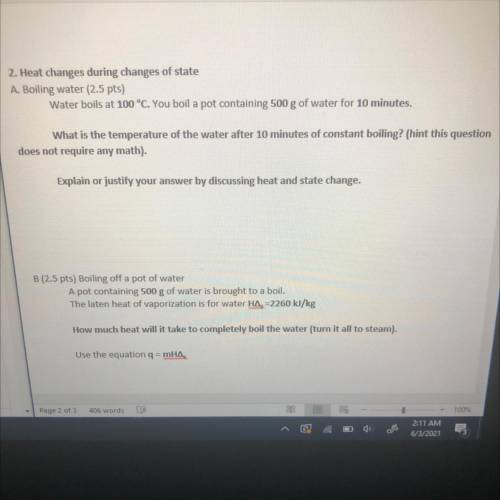2. Heat changes during changes of state
A. Boiling water (2.5 pts)
Water boils at 100 °C. You...

Chemistry, 03.06.2021 14:00, tonimgreen17p6vqjq
2. Heat changes during changes of state
A. Boiling water (2.5 pts)
Water boils at 100 °C. You boil a pot containing 500 g of water for 10 minutes.
What is the temperature of the water after 10 minutes of constant boiling? (hint this question
does not require any math).
Explain or justify your answer by discussing heat and state change.
B (2.5 pts) Boiling off a pot of water
A pot containing 500 g of water is brought to a boil. The later heat of vaporization is for water H=2260 kJ/kg
How much heat will it take to completely boil the water (turn it all to steam) of water is brought to a boil.


Answers: 3
Other questions on the subject: Chemistry

Chemistry, 21.06.2019 16:40, ricardoamora54
Who is better, messi or cristiano, i need this for a chemistry class. asap
Answers: 1

Chemistry, 21.06.2019 22:30, 20heldmadison
Hot air balloons float in the air because of the difference in density between cold and hot air. in this problem, you will estimate the minimum temperature the gas inside the balloon needs to be, for it to take off. to do this, use the following variables and make these assumptions: the combined weight of the pilot basket together with that of the balloon fabric and other equipment is w. the volume of the hot air inside the balloon when it is inflated is v. the absolute temperature of the hot air at the bottom of the balloon is th (where th> tc). the absolute temperature of the cold air outside the balloon is tc and its density is ďc. the balloon is open at the bottom, so that the pressure inside and outside the balloon is the same. as always, treat air as an ideal gas. use g for the magnitude of the acceleration due to gravity.
Answers: 1


Chemistry, 23.06.2019 14:00, LeoInc6806
[07.06] which of the following chemical reactions is an oxidation-reduction reaction? (2 points) wo3 + 3h2 yields w + 3h2o kno3 + licl yields lino3 + kcl caso4 + 2nacl yields na2so4 + cacl2 mg(no3)2 + 2hbr yields mgbr2 + 2hno3
Answers: 1
Do you know the correct answer?
Questions in other subjects:

Mathematics, 28.09.2019 06:00


Mathematics, 28.09.2019 06:00

Mathematics, 28.09.2019 06:00


Geography, 28.09.2019 06:00

Biology, 28.09.2019 06:00

Mathematics, 28.09.2019 06:00

Biology, 28.09.2019 06:00






